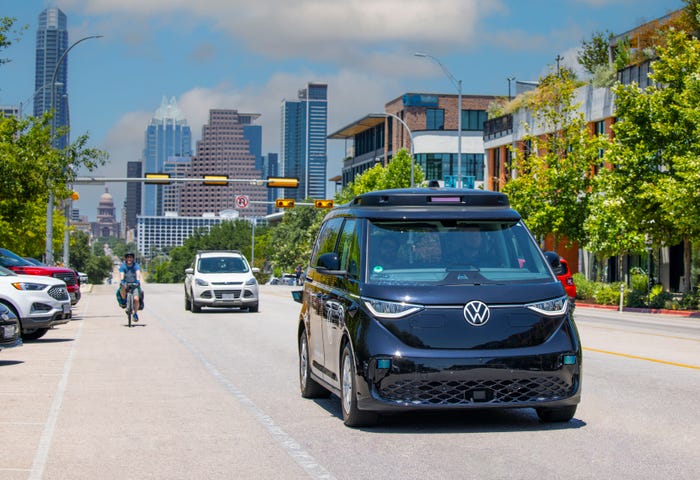Volkswagen Testing Self-Driving Cars in Austin
VW will deploy a fleet of 10 electric self-driving vehicles as part of the program

Volkswagen has confirmed that it is set to start testing autonomous vehicles (AVs) in Austin.
The German automaker will kick things off by deploying a fleet of 10 electric ID. Buzz AD vehicles on the streets of the Texas city.
The ID. Buzz models will feature an autonomous drive platform developed in partnership with Israel’s Mobileye and the program will be managed by the company’s United States arm, Volkswagen Group of America (VWGoA).
It’s hoped the Austin initiative will prove a launch pad for more extensive AV operations over the next three years, with VWGoA revealing that plans are in place to conduct testing in “at least four more American cities” during that time frame.
Additionally, the company has earmarked Austin for a potential commercial launch of AVs in 2026.
The rollout marks a new direction for Volkswagen’s self-driving program after the company dramatically pulled the plug on its investment in start-up Argo AI in October last year, alongside partner Ford, causing the Pittsburgh-based company to fold. Previous versions of the ID. Buzz AD had featured tech from Argo AI.
On ending its relationship with Argo AI, Volkswagen expressed the need for “focus and speed” in developing autonomous driving technology and pledged to extend collaborations with other existing partners.

Credit" Volkswagen
As part of the new direction, VWGoA has established a new subsidiary named Volkswagen ADMT (Autonomous Drive Mobility and Transport) to support the rollout, with bases in Austin and Belmont, California. The subsidiary plans to employ staff who were previously with Argo AI.
The ID. Buzz vehicles to be tested in Austin are fitted with Mobileye tech, plus cameras, lidar and radar sensors, and will rack up mileage in geofenced areas, collecting data across a range of different driving scenarios. Although the vehicles have Level 4 capability, human safety monitors will be on board at all times during the initial testing phase. Level 4 is classed by the Society of Automotive Engineers as full self-driving functionality in specific locations.
In the long term, VWGoA says it plans to offer fleets of ID. Buzz AD vehicles to companies looking to provide autonomous transportation, alongside fleet management solutions. Operating a dedicated ride-hailing service itself – as, for example, General Motors has done with Cruise – is not on the immediate agenda.
The U.S. program is merely part of Volkswagen’s global effort to accelerate the rollout of its self-driving tech, with testing already being carried out in tandem with Bosch in Germany and huge investment in Beijing robotics company Horizon geared towards delivering solutions in China.
“Expanding Volkswagen Group’s global autonomous driving vehicle program to the United States marks an important milestone for us,” said Pablo Di Si, president and CEO of VWGoA. “In the future, we will tap into rising demand for new mobility services, and with our iconic ID. Buzz, we will also offer a truly captivating product to support transportation services American consumers can rely upon and trust.”
Katrin Lohmann, president of Volkswagen ADMT added: “We selected Austin as the first US hub, as the city has a track record for embracing innovation and offers a conducive climate for the testing of autonomous vehicles.”
Self-driving taxi companies Waymo and Cruise are already active in Austin.
About the Author
You May Also Like








